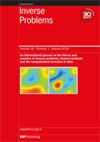贝叶斯曲线拟合的自适应调节可逆跳变算法
IF 2
2区 数学
Q1 MATHEMATICS, APPLIED
引用次数: 0
摘要
贝叶斯曲线拟合在逆问题中发挥着重要作用,通常使用可逆跃迁马尔科夫链蒙特卡罗(RJMCMC)算法来解决。然而,如果没有经过适当调整的建议,这种算法的计算效率可能会很低。作为一种补救措施,我们通过将自适应 Metropolis 采样器从固定维度扩展到跨维度,为曲线拟合问题提出了一种自适应 RJMCMC 算法。在这种算法中,建议函数的大小和方向都可以在采样过程中自动调整。具体来说,曲线拟合设置允许在有代表性的点网格上逼近先验未知函数的后验协方差。这种近似方法有助于定义有效的建议。此外,我们还通过非可逆并行回火引入了该算法的辅助回火版本。为了评估这些算法,我们进行了一系列受控实验的数值测试。结果表明,自适应算法的效率明显高于传统算法。即使在后验分布非常复杂,导致辅助回火的传统 RJMCMC 无法有效收敛的情况下,所提出的辅助回火自适应 RJMCMC 的表现也令人满意。此外,我们还提出了一个现实的反演例子来测试算法。自适应算法的成功应用再次将其与传统算法区分开来,后者即使经过数百万次迭代也无法有效收敛。本文章由计算机程序翻译,如有差异,请以英文原文为准。
Adaptive tempered reversible jump algorithm for Bayesian curve fitting
Bayesian curve fitting plays an important role in inverse problems, and is often addressed using the reversible jump Markov chain Monte Carlo (RJMCMC) algorithm. However, this algorithm can be computationally inefficient without appropriately tuned proposals. As a remedy, we present an adaptive RJMCMC algorithm for the curve fitting problems by extending the adaptive Metropolis sampler from a fixed-dimensional to a trans-dimensional case. In this presented algorithm, both the size and orientation of the proposal function can be automatically adjusted in the sampling process. Specifically, the curve fitting setting allows for the approximation of the posterior covariance of the a priori unknown function on a representative grid of points. This approximation facilitates the definition of efficient proposals. In addition, we introduce an auxiliary-tempered version of this algorithm via non-reversible parallel tempering. To evaluate the algorithms, we conduct numerical tests involving a series of controlled experiments. The results demonstrate that the adaptive algorithms exhibit significantly higher efficiency compared to the conventional ones. Even in cases where the posterior distribution is highly complex, leading to ineffective convergence in the auxiliary-tempered conventional RJMCMC, the proposed auxiliary-tempered adaptive RJMCMC performs satisfactorily. Furthermore, we present a realistic inverse example to test the algorithms. The successful application of the adaptive algorithm distinguishes it again from the conventional one that fails to converge effectively even after millions of iterations.
求助全文
通过发布文献求助,成功后即可免费获取论文全文。
去求助
来源期刊

Inverse Problems
数学-物理:数学物理
CiteScore
4.40
自引率
14.30%
发文量
115
审稿时长
2.3 months
期刊介绍:
An interdisciplinary journal combining mathematical and experimental papers on inverse problems with theoretical, numerical and practical approaches to their solution.
As well as applied mathematicians, physical scientists and engineers, the readership includes those working in geophysics, radar, optics, biology, acoustics, communication theory, signal processing and imaging, among others.
The emphasis is on publishing original contributions to methods of solving mathematical, physical and applied problems. To be publishable in this journal, papers must meet the highest standards of scientific quality, contain significant and original new science and should present substantial advancement in the field. Due to the broad scope of the journal, we require that authors provide sufficient introductory material to appeal to the wide readership and that articles which are not explicitly applied include a discussion of possible applications.
 求助内容:
求助内容: 应助结果提醒方式:
应助结果提醒方式:


